|
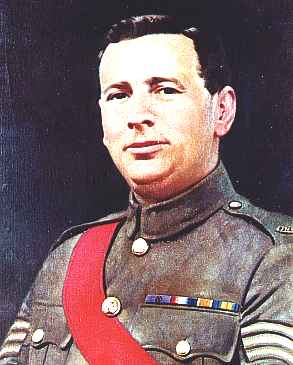 |
Charles
Richard
Sharpe
VC
|
 |
Charles Richard Sharpe was born at Pickworth, ten miles north west of Bourne,
to Robert and Charlotte Ann Sharpe on 2nd April 1889 and christened at the village church of St Andrew's the following year.
He attended the village school and left to become a farm labourer, working for the churchwarden Mr. William Knight who was also a local landowner.
He left the village in 1905 when he was only sixteen (the family legend is that he ran away from home) and enlisted in the Second Battalion, the Lincolnshire Regiment as a private but received his first promotion to lance corporal at the age of 19. When the First World War broke out, his regiment was
serving in Bermuda but was called to active service, arriving in France on 6th
November 1914, and by the following spring, he had been promoted to the rank of acting corporal.
During the spring of 1915, in an Allied assault on Fromelles by General Henry Rawlinson's 4th Army during the Battle of Aubers Ridge, Sharpe, then aged 26, became the first soldier of the war from
his regiment to win the Victoria Cross, Britain's highest military decoration for gallantry in the field, awarded for most conspicuous bravery, a daring or pre-eminent act of valour, self sacrifice or extreme devotion to duty in the presence of the enemy. When two companies of his battalion reached the German lines near Rouges Bancs, north-east of Neuve Chapelle, after crossing No Man's Land under heavy fire, he captured an enemy trench single handed and led a successful assault on another. The official citation published in the London Gazette on 29th June 1915 said:
|

Extract from The London Gazette 29th June 1915 |
However, the somewhat formalised account of the incident misses the graphic detail of what actually occurred. Sharpe was the sole survivor of the initial part of the assault. His commander had been killed and he, as the next senior rank, was in charge with some thirty hand grenade bombs in pouches strapped to his uniform, leading colleagues similarly armed across a muddy, misty battlefield. His men were being shot down one by one as they approached the German trench until he was left standing alone but the bombs he was using were having a deadly effect with the enemy running in all directions trying to escape. He took the fifty-yard trench and was then joined by four other soldiers from another regiment who then attacked the enemy again, tossing their bombs so accurately that they captured another trench, this time measuring some 250 yards.
Sharpe, who was always known by his nickname "Shadder", returned to England on leave
for two months and on 24th July 1915, received his award from King George V at Windsor Castle and then took part in a recruiting drive to urge young, single men to volunteer for military service, visiting many places in Lincolnshire including Spalding and Bourne. He was feted, cheered and applauded wherever he went but in the brief speeches he made, he also indicated that he was keen to join his comrades in the trenches on the Western Front. He was eventually recalled to his regiment and again became involved in front line action when he was the sole survivor on a ten-man bombing raid on the German trenches in Flanders and was badly wounded by a bomb and although he recovered and continued to serve, he carried several pieces of shrapnel in his body until he died.
He remained in the army after the end of the war, reaching the rank of sergeant, although some records say that he became a company sergeant major but this may have been an acting rank. He also saw a brief spell of service in India and apart from his
VC and campaign medals, he was awarded the Long Service and Good Conduct Medal for 18 years of exemplary service. He continued with the colours for a further five years after that and was discharged in 1928 with a total of 23 years' service but returned to the army for a further two years during the Second World War when he was in his fifties and although too old for active service, he was gainfully employed at home as a Master Sergeant Cook although because of his reputation, he often helped in recruiting campaigns and his photograph with details of his exploits was frequently displayed in recruiting offices throughout the country. His love of cookery however never left him and relatives still remember some of the dishes he prepared in later years.
Charles Sharpe married a widow, Mrs Rose Ivy Sibley (née Cutting), and
they had three children, Elizabeth Ann, who was born on 8th October 1933,
John William, born on 4th September 1935, and Norris, birth date unknown
but who died at the age of seven.
As a
civilian, he worked on various jobs in the Grantham and Bourne areas, including
time as a labourer and cleaner with the Raymond Mays BRM organisation at Bourne and he also taught gardening and physical training
at the Hereward Approved School in Bourne.
| It was here that he was injured by a splinter when
the school was bombed towards the end of the Second World War. He lived at No 68 Woodview
and after a spell as a council refuse collector, his last job was as
a gardener for the Bourne United Charities and ironically, one of
his duties was to tend the cenotaph and surrounds in the town's War
Memorial gardens where the dead from two world wars are remembered.
He eventually moved to live with Dorothy, his
daughter from an earlier marriage, at Workington, Cumbria, but
thirteen months later, on 17th February 1963, he was taken ill and
died in Workington Infirmary after a fall, aged 73. The funeral was
held at St Nicholas' Church, Lincoln, with full military honours and
he was later buried at the city's Newport Cemetery. |
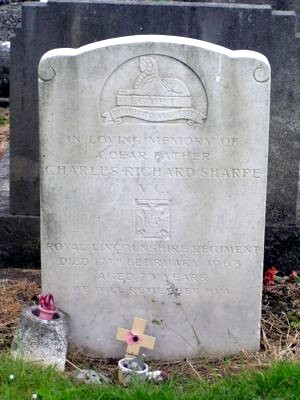 |
Charles Sharpe was from all contemporary accounts, one of the most unlikely war heroes. He was a farm worker fiercely proud of his rural Lincolnshire heritage, totally unpretentious and an utterly unassuming and modest man. On returning to England after winning the
VC, he was asked by a journalist to relate the details of his actions but he said simply: "A British soldier will never glorify his own deeds. I only did my duty."
There were many and varied accounts in the newspapers of the day about the events in which he took part but we must look to the official account in the citation for the most accurate. However, his exploits, and those of other soldiers who had distinguished themselves in action, continued to fascinate the public and four years after his death Sharpe was immortalised in a five-penny comic,
The Victor, published on 2nd September 1967, giving an idealised account in cartoon strips of the attack on the German trenches that won him his
VC.
After his death, his medals and decorations passed to his children who decided to sell them in 1989 and they were sent to Christie's auction rooms in London.
In addition to the Victoria Cross, there were eight campaign and commemorative
medals.
|
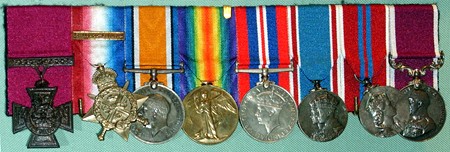 |
|
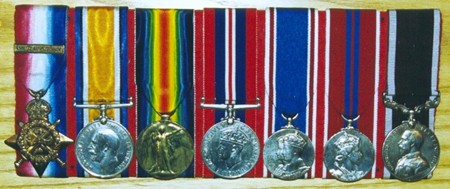 |
|
The actual medals (top) and copies (below)
The Victoria Cross (top
picture only)
The 1914 Star.
The British War Medal 1914-20.
The Victory Medal 1914-18.
The War Medal 1939-45.
The George V Coronation Medal 1935.
The Queen Elizabeth II Coronation Medal 1953.
The Long Service & Good Conduct Medal. |
The sale attracted a great deal of attention and press coverage and two local men, Fred King and Melvyn Patrick, both deeply interested in the First World War, launched a fund to buy the medals for public display in the town but the £4,000 they raised in donations and promises was insufficient to secure them and they went to a surprise bidder for £17,000 who later turned out to be Mr. Chris Farmer, treasurer and now Chief Executive, of South Kesteven District Council, who was buying them on behalf of the community to commemorate the centenary year of Sharpe's birth. The medals were cleaned, polished and court-mounted by a specialist firm in Bridlington and wooden plinths were made by craftsmen from the council's own workshops in Grantham in Lincolnshire to enable them to be put on permanent display. They are now on show with the council's regalia in the chairman's office at the council's headquarters at Grantham, although visitors can see them on request
while copies are on display at the Royal Lincolnshire Regiment's museum in
Lincoln.
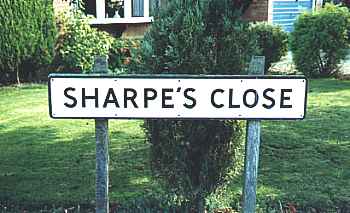 |
The name of Charles Sharpe has also been
remembered in Bourne's street names and a small cul-de-sac off Beech Avenue is known today as Sharpe's Close. |
There is another reminder of his bravery at the Royal Lincolnshire Regiment Museum in Lincoln where the horrors of trench warfare that he experienced during the First World War have been re-created. The centrepiece of the display is the simulation of a section of German trench which was stormed and bombed by Sharpe in an attempt to change the image of regimental museums as merely collections of dusty old uniforms and medals in cases by telling in sights and sounds the stories of ordinary soldiers and the conditions in which they fought. The display was opened in April 2000 by the Duke of York at a total cost of £200,000, more than a quarter of which came from a successful fund raising campaign while the rest was obtained from National Lottery grants.
|
The Lincolnshire Regiment has two other holders of the Victoria Cross. The first was awarded in 1857 to Private John Kirk for his bravery during the Indian Mutiny and the other to Major Charles Hoey for his exploits while fighting the Japanese in Burma in 1943.
The Victoria Cross was founded by Queen Victoria towards the conclusion of the Crimean War in 1856 and, until the supply was exhausted, was cast from the metal of Russian guns taken at Sebastopol.
It consists of a Maltese cross made of bronze and bearing in the centre the royal crown surmounted by a lion and with the scroll inscribed with just two words "For
Valour".
|

|
The winning of the
VC carried with it a pension of £10 per annum which could, under special circumstances, be made up to £75. Its recipients were only ever men but a Royal Warrant of 1920 extended eligibility to women of military nursing services and to civilians of either sex when serving under naval, army or air authorities. The number of
VC awards made to members of the armed services during the First World War was 633 and of this number 187 were killed during their acts of heroism. The number of awards during the Second World War was 179 of which 82 were posthumous awards.
|
THE WAR HERO'S MILITARY CHEST
Sergeant Sharpe's
military chest came to light in July 2009 when Mrs Hilda Sharpe, his
niece by marriage, revealed that it had been in her possession for
several years. The chest was used by him to store his personal
belongings each time he was posted overseas and he usually sent
it to one of his family for safe keeping. |
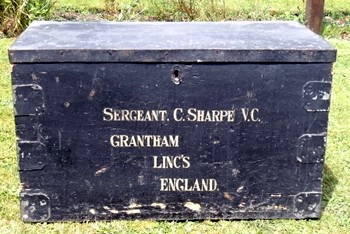 |
|
This was usually
to Arthur Sharpe, one of his two brothers, and his address in
Grantham is painted on one side of the box. But in later years he
would deposit it with Mrs Hilda Sharpe, widow of Ted Sharpe, son of
his other brother Wilf, who lives at Ingoldsby, near Sleaford, and
it remains in her care. |
|
Extract from the Stamford Mercury, Friday 6th August 1915.
V.C.. AS RECRUITER.
CORP. SHARPE'S MEETING AT BOURNE.
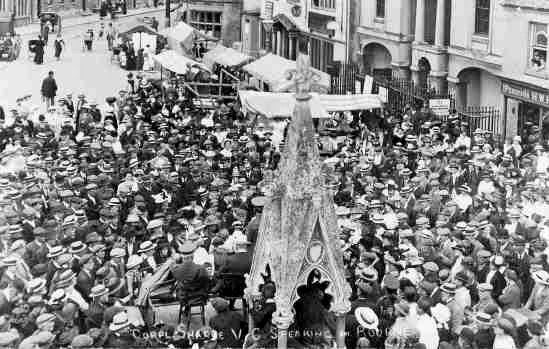
On the 29th ult. Bourne gave a rousing demonstration to Corporal Sharpe, the Haceby V.C. His entry into the town happily coincided with the boys of the Council
School leaving school, and the youthful generation, at the instigation of their popular master (Mr. J. J. Davies) gathered informally near the Market-place, and cheers from their stentorian voices re-echoed the sentiments of the townspeople. Mr. Davies made a few brief and appropriate remarks, welcoming the V.C. and Corp. Sharpe, in acknowledging the compliment, told the boys that when they grew up to manhood that they should don the khaki and be prepared at any time to fight for their King and country. An open-air public meeting was held in the Market-place at 2.30 p. m., when a large crowd congregated, a trolley placed contiguous to the Fountain being the platform. The meeting was presided over by Mr. T. M. Baxter, the chairman of the Bourne Urban District Council supported by Colonel Starkey, Recruiting Officer for Kesteven, Corp. Sharpe, and Mr. H. A. Sneath, of Thurlby. Many tradespeople had decorated their premises. Mr. T. M. Baxter spoke in praise of Corp. Sharpe's valour, and said he was a credit to the country and to the Army. Corp. Sharpe, who was vociferously cheered, said the best way to thank him was for the young men to come forward at the present moment. He appealed for every single eligible young man to join now, and there were many of them who ought to do so. (Hear, hear.) Let them remember that the contentment at home was caused by the soldier being in the trenches. (Hear, hear.) The Lincs. Regt. had a fine record in France. They captured the first gun belonging to the enemy, and he hoped they would capture the last gun the Germans had got. (Applause.) Col. Starkey, in the course of a patriotic address, said Corp.
Sharpe had earned the greatest distinction the Army could offer. (Applause.) Mr. H. A. Sneath, of Thurlby, a member of the local Parliamentary Recruiting Committee, also spoke, and he urged those present to take the message of Corp. Sharpe to the young men that they knew who were eligible for service. (Hear, hear.) The Chairman then presented to Corporal Sharpe a walking stick, together with an envelope containing some bank notes, and Corp. Sharpe acknowledged the gift in a few suitable words. Another interesting incident was the presentation of a beautiful bouquet, tied with red, white. and blue ribbon, with a few packets of chocolate attached. The bouquet wm handed to the hero by the Matron of the Military Hospital. In the audience were a large number of local wounded soldiers.
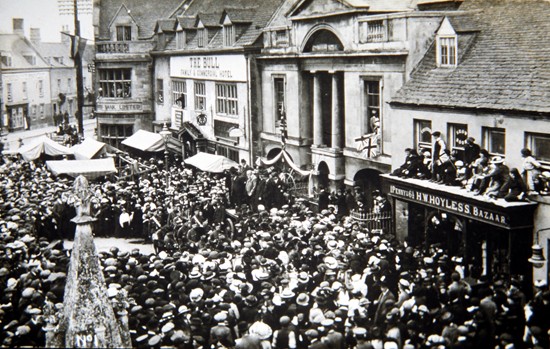
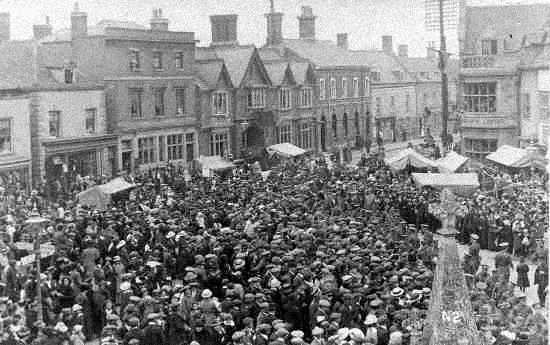 |
The action in which Charles Sharpe won
his VC
Memorial paving stone marks VC
centenary
See also The
Lincolnshire Regiment Hereward Approved
School

Go to:
Main Index Villages
Index
|











